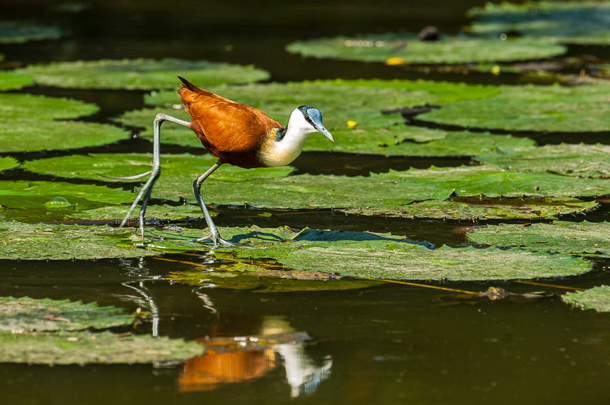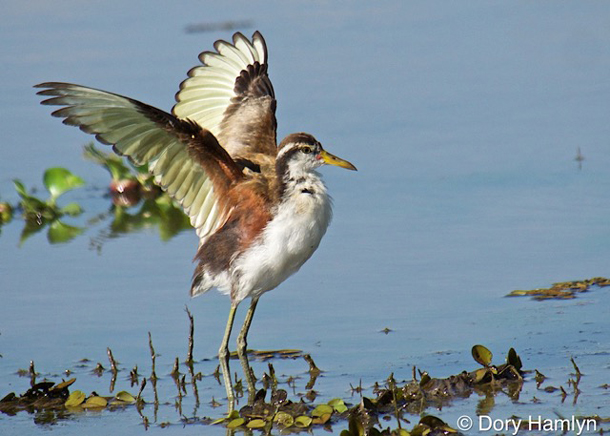BirdNote®: Lily-Trotters, Jesus Birds
Air Date: Week of December 27, 2019

An African jacana appears to walk on water with the aid of lily pads and its long toes. (Photo: zsispeo, CC)
The strange wading birds known as jacanas are nick-named "lily-trotters" for their ability to walk on lilypads. In Jamaica, they're known as "Jesus birds," because they appear to be walking on water — a feat made possible by their long toes. But that's not all that's cool about jacanas, and BirdNote’s Michael Stein tells us more.
Transcript
[BIRDNOTE THEME]
BASCOMB: Here’s this week’s BirdNote with Michael Stein.
BirdNote®
Jacana - Lily-trotter
[Northern Jacana calls, LNS # 140224]
STEIN: The Northern Jacana (for information about pronunciation, please see below*), found in Mexico, Central and South America, and Cuba. And the bird with the longest toes -- relative to its body size -- of any bird. Those toes are l-o-n-g, and they're made for walkin'. Living in wetlands, Jacanas are nicknamed "lily-trotters," for their ability to walk on lilypads. In Jamaica, they're known as "Jesus birds," because it looks as if they're walking on water. Feats possible only because of those toes. [LNS #140224 2:40 and 3:14]
But that's not all that's cool about the jacana. The males carry their young under their wings. Now, you've seen a mother housecat -- kitten dangling from her mouth -- carrying kittens one by one to safety. Well, the male jacana will carry his young, too – except that he can carry several at once. [Northern Jacana LNS # 140224]

An immature wattled jacana stretches its wings (Photo: © Dory Hamlyn)
So picture this wildly colorful wading bird, crouching down and spreading his wings. The young move in under him, and he sweeps them up and carries them off, tiny legs dangling from under his wings. It doesn't look very comfortable for the young ones, but it sure is safe. [Northern Jacana LNS # 140224]
I’m Michael Stein.
[Northern Jacana LNS # 140224]
###
Written by Ellen Blackstone
Bird sounds provided by The Macaulay Library of Natural Sounds at the Cornell Lab of Ornithology, Ithaca, New York. Jacana recorded by Gerrit Vyn
BirdNote's theme music was composed and played by Nancy Rumbel and John Kessler.
Producer: John Kessler
Executive Producer: Dominic Black
© 2015 Tune In to Nature.org February 2018 Narrator: Michael Stein
ID# jacana-01-2015-02-09 jacana-01
* "Jacana" seems to be pronounced in many different ways. Julie Zickefoose in her blog says the pronunciation of "jacana" in the Tupi Indian language is zhuh-sah-NAH, with the emphasis on the last syllable. However, the Cornell recordist of the Northern Jacana heard in this show, Gerrit Vyn, says juh-CAH-nuh, so in this case, we went with that. (Listen here: http://macaulaylibrary.org/audio/140224) For a pronunciation in Brazilian Portuguese, check out Forvo.com: http://www.forvo.com/word/ja%C3%A7an%C3%A3/#pt
https://www.birdnote.org/show/jacana-lily-trotter
Links
Living on Earth wants to hear from you!
Living on Earth
62 Calef Highway, Suite 212
Lee, NH 03861
Telephone: 617-287-4121
E-mail: comments@loe.org
Newsletter [Click here]
Donate to Living on Earth!
Living on Earth is an independent media program and relies entirely on contributions from listeners and institutions supporting public service. Please donate now to preserve an independent environmental voice.
NewsletterLiving on Earth offers a weekly delivery of the show's rundown to your mailbox. Sign up for our newsletter today!
 Sailors For The Sea: Be the change you want to sea.
Sailors For The Sea: Be the change you want to sea.
 The Grantham Foundation for the Protection of the Environment: Committed to protecting and improving the health of the global environment.
The Grantham Foundation for the Protection of the Environment: Committed to protecting and improving the health of the global environment.
 Contribute to Living on Earth and receive, as our gift to you, an archival print of one of Mark Seth Lender's extraordinary wildlife photographs. Follow the link to see Mark's current collection of photographs.
Contribute to Living on Earth and receive, as our gift to you, an archival print of one of Mark Seth Lender's extraordinary wildlife photographs. Follow the link to see Mark's current collection of photographs.
 Buy a signed copy of Mark Seth Lender's book Smeagull the Seagull & support Living on Earth
Buy a signed copy of Mark Seth Lender's book Smeagull the Seagull & support Living on Earth

